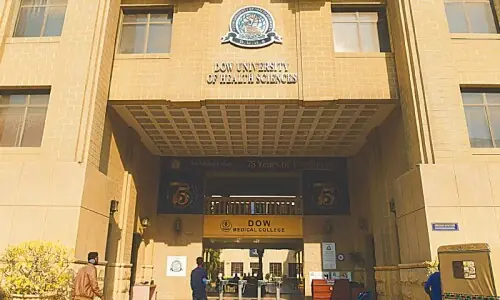KARACHI: Health institutions must be encouraged to collect local data regarding morbidity and mortality of serious respiratory illnesses and create awareness among family physicians about early detection of influenza, management and prevention through continuing medical education, infectious diseases.
This was stated by experts of the Influenza Prevention Consensus Forum Pakistan at an advisory meeting held at a local hotel.
Organised by the Medical Microbiology and Infectious Diseases Society of Pakistan (MMIDSP), the meeting aimed at having a consensus on the national guidelines regarding flu prevention and vaccination based on scientific evidence in the country.
The move comes following the country’s success in dealing with the unprecedented Covid-19 pandemic based on advice from infectious diseases doctors and public health experts.
According to the World Health Organisation (WHO) data published in 2020, influenza and pneumonia killed 83,483 people in Pakistan, accounting for 5.72 per cent of all deaths.
Diagnostics for influenza are poor in the country, with the public sector relying heavily on the National Institute of Health which has a WHO-accredited laboratory. For the masses going for tests at private labs is an added expense, with the “it’s just the flu” mindset at times leading to severe illness and death.
The event was moderated by society president Prof Dr Bushra Jamil.
Participants included WHO Pakistan Virology Expert Dr Uzma Bashir; chairman & professor of paediatric medicine, King Edward Medical University & Mayo Hospital Lahore, Prof Haroon Hamid; the chair of pulmonology & critical care, Khyber Teaching Hospital, Peshawar, Prof Saadia Ashraf; professor of cardiology & interventional cardiology at NICVD Karachi, Prof Fawad Farooq; the chair & ENT consultant at PIMS, Islamabad, Prof Altaf Hussain; Dr Ainan Arshad, Dr Shobha Luxmi and Dr Samreen Zaidi.
The forum agreed on having local consensus or guidelines regarding flu prevention and vaccination, improving data collection regarding morbidity and mortality of serious respiratory illnesses, and increasing awareness at the general practitioner level.
The experts also called for mass awareness about the non-pharmacological interventions (NPI) and benefits of influenza vaccination via print, electronic and social media.
The consensus sought an evidence-based approach for the influenza vaccine, vaccination age and vaccination in association with co-morbidities.
“Respiratory tract infections are a leading cause of morbidity and mortality in Pakistan. Because of the limited availability of reliable diagnostics, the cause of infection remains undiagnosed, leading to inappropriate treatment and higher mortality. Influenza viruses circulate around the globe with seasonal surges. Pakistan is no exception. Since the 2009 influenza pandemic, testing for influenza has increased. However, due to a lack of awareness among physicians, tests are often not done and information on the true extent of infection remains limited,” said Prof Jamil.
The experts noted the dire need to create awareness about flu, particularly among the immunocompromised.
“Influenza has serious consequences for young children, the elderly, and those with diabetes, hypertension, heart conditions, and other illnesses. Severe infection can lead to multi-organ failure and death. Early diagnosis and treatment is essential to prevent complications,” they opined.
The forum highlighted that influenza was preventable. Yearly vaccination is recommended for those at high risk of infection, including healthcare workers and other susceptible groups.
The experts dispelled the fear that the vaccine would affect male or female fertility. “The inactivated vaccine is safe in pregnancy and provides protection to both, the mother and baby,” they added.
The group stressed that frequent hand washing, wearing masks, and maintaining social distance were non-pharmaceutical interventions that helped limit the spread of influenza.
Published in Dawn, June 8th, 2022


































